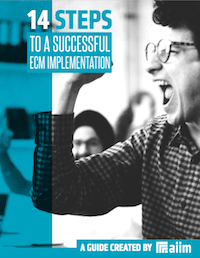The AIIM Blog
Keep your finger on the pulse of Intelligent Information Management with industry news, trends, and best practices.
Certified Information Professional (CIP) | Intelligent Information Management (IIM)
The Certified Information Professional (CIP) has come to represent a badge of competency and knowledge at the top of the knowledge worker pyramid for those entrusted with the task of building an information STRATEGY in a time of digital disruption. Broader than Records Management and Information Governance, Information Professionals are charged with these questions: Who owns the BIG PICTURE for how information is managed in our organization? Who owns our information management STRATEGY? Who can helps us treat information as the critical business asset it has become? The accelerating pace of Digital Disruption makes this role more important -- and different -- than ever. But before going there, how exactly is the emerging era of Digital Transformation different from where we are now?
Share
Certified Information Professional (CIP) | Intelligent Information Management (IIM)
Many people do not realize that AIIM was founded in 1943 as the National Microfilm Association. Many people are mystified about how an organizational journey could somehow begin in 1943 with microfilm, and wind up in 2016 with content and information management. So what is the connective tissue in this strange story? I think it boils down to 3 words: People, Process, and Technology.
Share

Making an ECM implementation successful requires planning and attention to detail. The best way to create the right solution is to identify organizational goals and priorities. Learn how to manage a successful implementation in our free guide.
Intelligent Information Management (IIM)
It is literally 20 years to the day since I first started at AIIM. I've been thinking about how the technology landscape has changed since I first walked on the scene at AIIM and what the implications of these changes are for how we think about what it means to be an “Information Professional." This was the heart of what I spoke about during my keynote at The AIIM Conference, and we've now published as a new e-book.
Share
Intelligent Information Management (IIM)
Managing and recording what the organization knows, what has been said, what inputs are received, what decisions and commitments have been made, and what results are achieved, is paramount to improvement and success. Failure to manage this information and make it available for sharing, search, controlled access, defined process, audit, and secure archive limits operational capability, stunts new initiatives, and exposes the business to potential liabilities.
Share
Intelligent Information Management (IIM)
I'm starting to work on my opening AIIM Conference keynote and thinking about how technology and the nature of what it means to be an information professional have changed and will continue to change— and also reflecting a bit on my 20 years in this crazy industry.
Share
Intelligent Information Management (IIM)
Maybe it was a bad idea to start a blog post after dinner because I have one thing on my mind… ICE CREAM! Are you craving it, too, now? Well, grab a bowl and read on. Trust me; this does eventually tie into Information Management.
Share